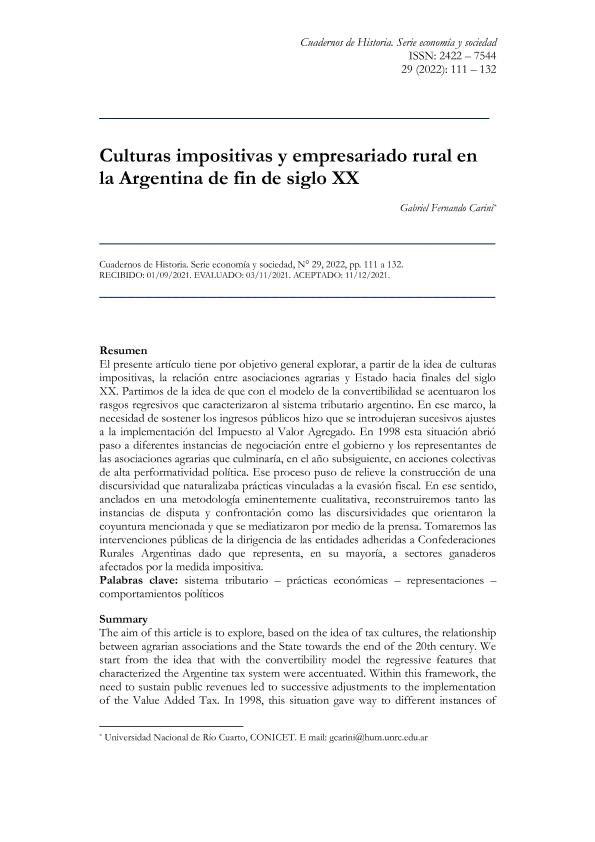Artículo
El presente artículo tiene por objetivo general explorar, a partir de la idea de culturas impositivas, la relación entre asociaciones agrarias y Estado hacia finales del siglo XX. Partimos de la idea de que con el modelo de la convertibilidad se acentuaron los rasgos regresivos que caracterizaron al sistema tributario argentino. En ese marco, la necesidad de sostener los ingresos públicos hizo que se introdujeran sucesivos ajustes a la implementación del Impuesto al Valor Agregado. En 1998 esta situación abrió paso a diferentes instancias de negociación entre el gobierno y los representantes de las asociaciones agrarias que culminaría, en el año subsiguiente, en acciones colectivas de alta performatividad política. Ese proceso puso de relieve la construcción de una discursividad que naturalizaba prácticas vinculadas a la evasión fiscal. En ese sentido, anclados en una metodología eminentemente cualitativa, reconstruiremos tanto las instancias de disputa y confrontación como las discursividades que orientaron la coyuntura mencionada y que se mediatizaron por medio de la prensa. Tomaremos las intervenciones públicas de la dirigencia de las entidades adheridas a Confederaciones Rurales Argentinas dado que representa, en su mayoría, a sectores ganaderos afectados por la medida impositiva. The aim of this article is to explore, based on the idea of tax cultures, the relationship between agrarian associations and the State towards the end of the 20th century. We start from the idea that with the convertibility model the regressive features that characterized the Argentine tax system were accentuated. Within this framework, the need to sustain public revenues led to successive adjustments to the implementation of the Value Added Tax. In 1998, this situation gave way to different instances of negotiation between the government and the representatives of the agrarian associations that would culminate, in the following year, in collective actions of high political performance. This process highlighted the construction of a discourse that naturalized practices linked to tax evasion. In this sense, anchored in an eminently qualitative methodology, we will reconstruct both the instances of dispute and confrontation and the discursivities that guided the aforementioned conjuncture and that were mediated through the press. We will take the public interventions of the leadership of the entities adhered to Confederaciones Rurales Argentinas since it represents, for the most part, livestock sectors affected by the tax measure.
Culturas impositivas y empresariado rural en la Argentina de fin de siglo XX
Fecha de publicación:
09/2022
Editorial:
Universidad Nacional de Cordoba. Facultad de Filosofía y Humanidades. Centro de Investigaciones
Revista:
Cuadernos de Historia. Serie Economía y Sociedad
ISSN:
2422-7544
Idioma:
Español
Tipo de recurso:
Artículo publicado
Clasificación temática:
Resumen
Archivos asociados
Licencia
Identificadores
Colecciones
Articulos (ISTE)
Articulos de INSTITUTO DE INVESTIGACIONES SOCIALES, TERRITORIALES Y EDUCATIVAS
Articulos de INSTITUTO DE INVESTIGACIONES SOCIALES, TERRITORIALES Y EDUCATIVAS
Citación
Carini, Gabriel Fernando; Culturas impositivas y empresariado rural en la Argentina de fin de siglo XX; Universidad Nacional de Cordoba. Facultad de Filosofía y Humanidades. Centro de Investigaciones; Cuadernos de Historia. Serie Economía y Sociedad; 29; 1; 9-2022; 111-132
Compartir
Altmétricas




